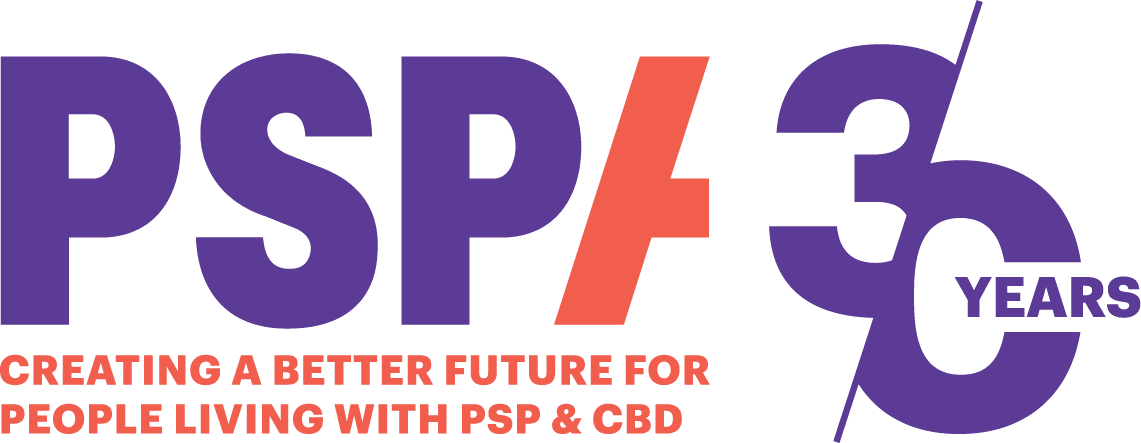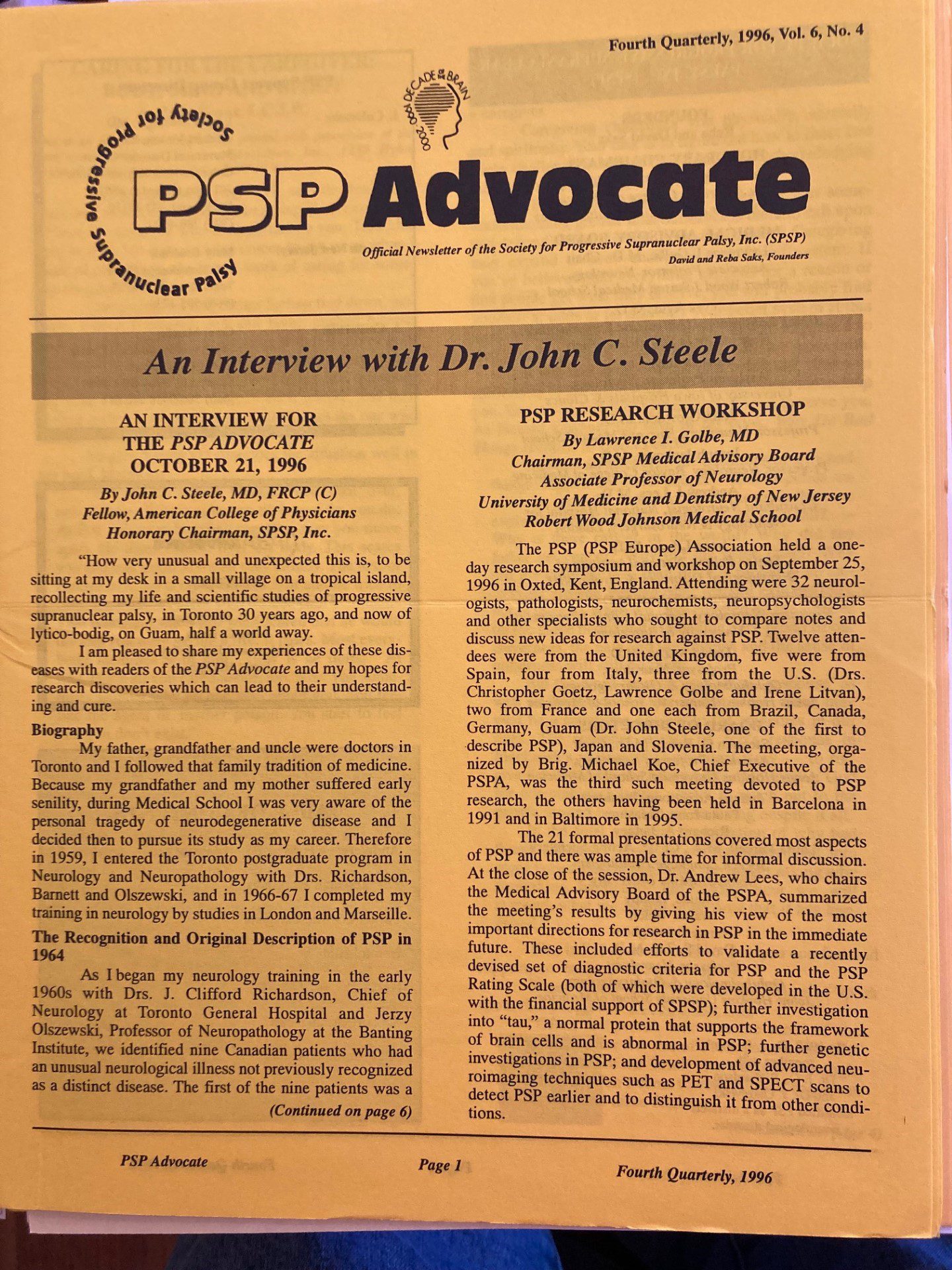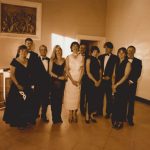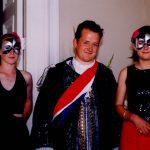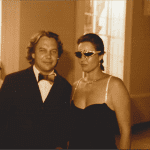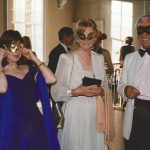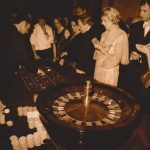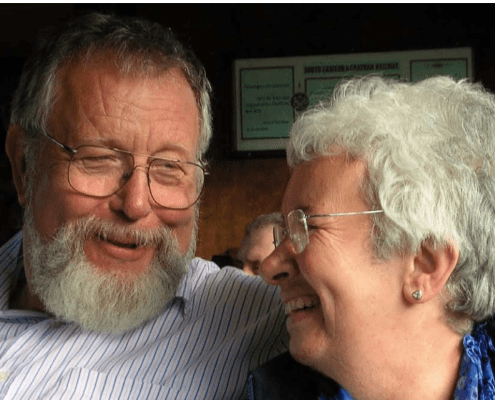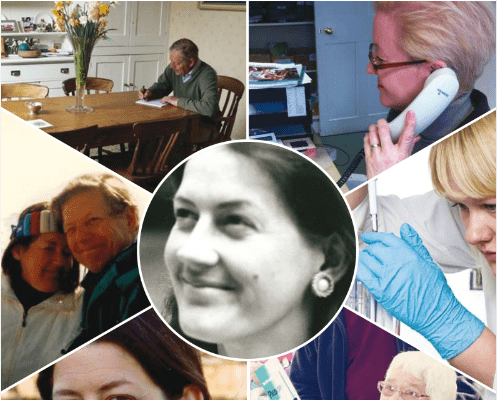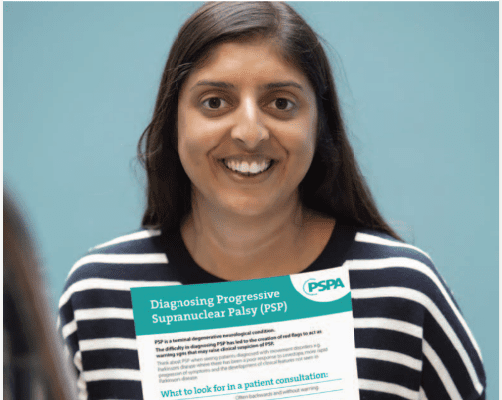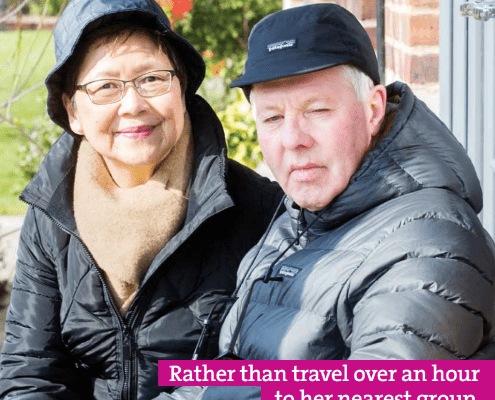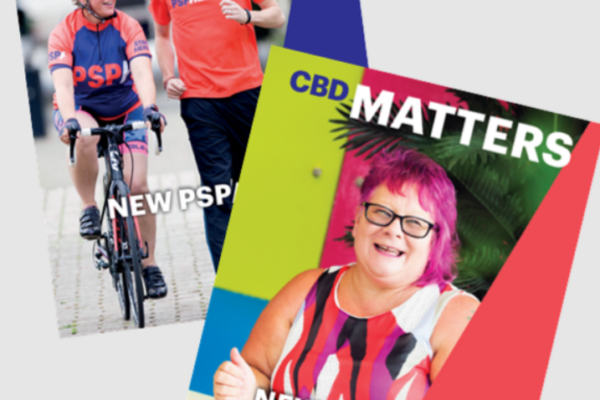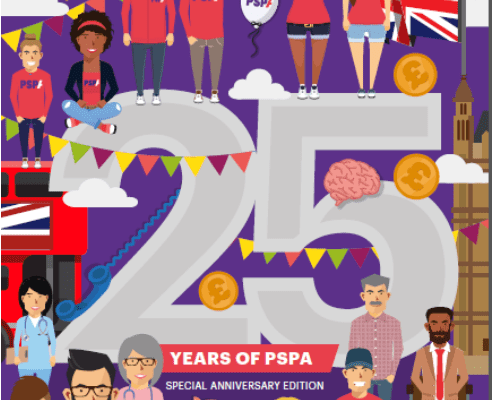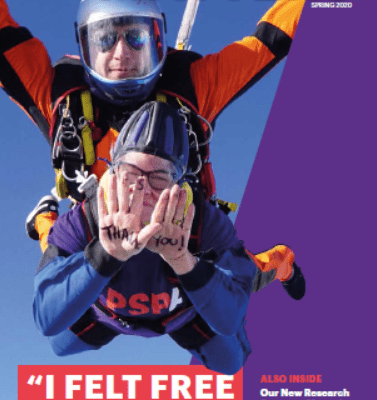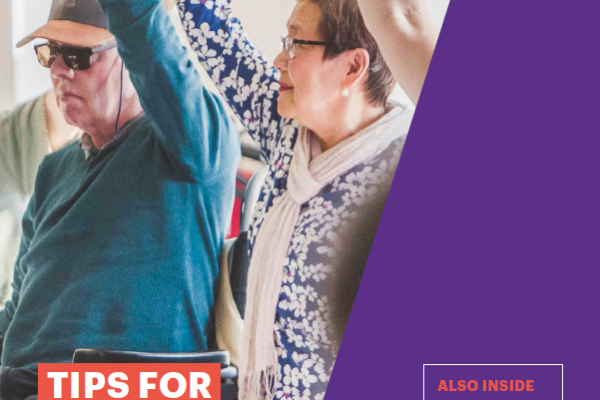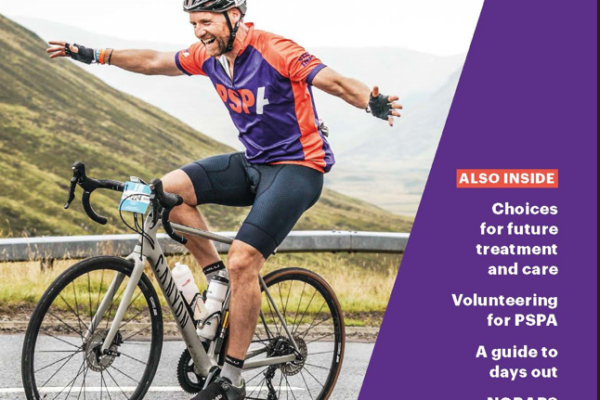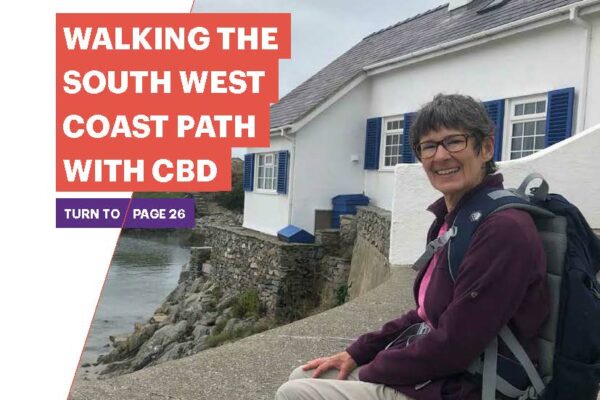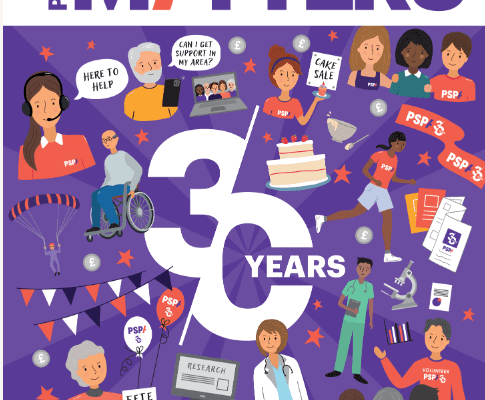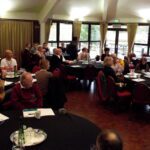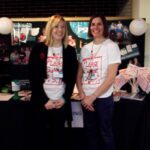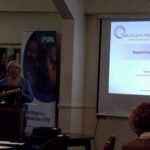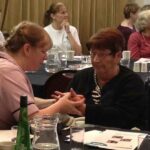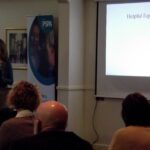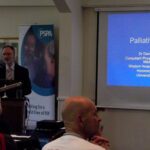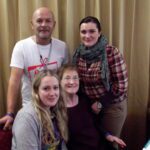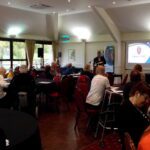PSPA Timeline
Scroll down to the milestones to learn more about our journey
Scroll Down and Click on the milestones to learn more about our journey
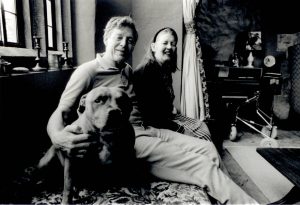
Motivated by his family’s own experience of PSP, Brigadier Michael Koe established PSPA in April 1994, driving forward an ambition of creating a better future. Here we look back at key PSPA moments.
Michael’s wife, Sara, was diagnosed with PSP in 1993 after developing worrying symptoms including problems with balance, speech, swallowing and looking up and down.
Local neurologists were unable to determine what was wrong.
Undeterred, the family continued investigations into Sara’s symptoms. This led to a week’s stay at the National Hospital for Neurology at Queen’s Square, London, under the care of Professor Martin Rossor and Professor Andrew Lees. During this stay, Sara received a diagnosis of PSP.
Driven by the bleak prognosis, Michael began researching what help was available.
He visited the American PSP Association, where he heard one specialist, Dr Irene Litvan, may be close to a cure. Unfortunately, this was incorrect.
Although the trip, was unsuccessful in terms of aiding Sara’s condition, it planted a seed in Michael’s mind. Setting up a charity in the UK to help other people affected by the condition.
When discussing the decision to set up PSPA, Michael said: “Sara and I were upset that no one knew, or seemed to care much about PSP. We were keen to do something to draw public attention to this particularly nasty brain disease and help others living with PSP. We also were determined to raise awareness and funds for research.”
So, in 1994 Michael joined forces with local MP, Michael Morris and friends; Sir Michael Carlton Smith, James Stanford and Sir John Greenaway to establish the UK PSP Association.
On 25 September 1996, Professor Larry Golbe was one of the leading professionals to speak at the first PSP & CBD Research Workshop in Kent (a summary provided in the Society of Progressive Supranuclear Palsy newsletter above).
The workshop was organised by Michael Koe, who was the CEO of PSPA at the time and marked the start of a great relationship with SPSP, now CurePSP. The workshop continued to be held bi-annually until 2018, when it was rebranded as the PSP & CBD International Research Symposium.
Professor Huw Morris has been working with PSPA since 1997 when he was hired as the charity’s first research fellow.
Here Professor Morris shares some insight into how his research career began and his continued relationship with PSPA.
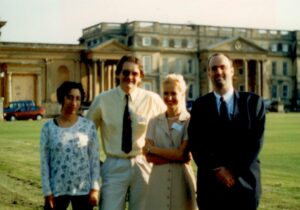
Part way through her neurology training in Edinburgh and Newcastle, Dr Uma Nath was approached by Professor David Burn to write a paper about the epidemiology of PSP.
It was whilst writing this paper, Uma’s interest in the condition grew:
“It was around the late 90’s that I was approached to write a paper about the epidemiology of PSP. At that time, very little research into PSP or CBD had been conducted. It was the fact that there was so little information and knowledge about the disease, together with Professor Burn’s clinical approach that really sparked my interest in the subject.”
With an interest growing, Professor Burn introduced Uma to PSPA and its founder, Michael Koe.
“I met Michael Koe at one of the research events he had organised in Northamptonshire, which is where the charity was based at the time.
“During the event, Michael shared the unforgettable experience of his wife being diagnosed with PSP. The fact they were sent away from the diagnosis appointment with little information and no idea of where to turn to for support or details about what would happen next, and how that then inspired Michael to establish a charity, really struck me.”
Michael helped highlight the basic facts and knowledge that were missing for PSP, including understanding how many people across the UK were affected. Information vital for growing interest and research into the subject.
Discussions led to Michael inviting Uma to conduct a prevalence study, fully funded by PSPA over two years.
In order to establish how common PSP was, Uma conducted a ‘Russian Doll ‘study. This was a three- tiered approach focusing on a national figure, a regional figure and a detailed overview.
“To start, I began to collate a central database of patients affected by PSP. I sent out a letter to around 250 neurologists, asking them to register their PSP patient details. I wasn’t expecting much of a response but I was pleasantly surprised. This exercise saw 577 cases of PSP confirmed.
“Next was the regional stage of the study, where I spoke to clinicians about their PSP patients and the symptoms they were experiencing.
“During the last stage, which was a much more rigorous approach, I worked with three GP surgeries to review their PSP patients. To do this I looked out for key words in the notes, including Steele-Richardson, Levodopa, Parkinson’s or Parkinsonism. In all, I closely reviewed 50 patients through this process.”
Taking this approach, Uma was able to establish a ratio per sample which is an ideal way to suggest a prevalence. Uma found this was 5 in every 100,000. The study also highlighted, it was taking around four years for individuals to be diagnosed with PSP, which is more than half the life span of the disease.
Uma’s study, and resulting papers, were received with great interest by the healthcare community including neurologists, GPs, ophthalmologists and more.
“There seemed to be a real appetite for learning more about PSP. This and the study conducted by Professor N Quinn and Professor A Schrag around the same time, led to more than 60 speaking opportunities across a 24-month period. People were eager to find out more, share best practice as well as improve diagnosis. A real buzz generated, which was exciting for me and I loved to see how it was encouraging people to open up their suspicions of PSP when speaking to patients.”
As well as sharing her knowledge, Uma’s work was celebrated across the UK. Uma’s study received three accolades; The Charles Symonds Platform Presentation Award, The Liversedge Prize from North East Neurologists Association and an achievement award from PSPA. Uma also received a commendation for her thesis.
In addition, her various papers based on the study were published in prestigious journals including Brain and Neurology, again helping to raise awareness of PSP and spark wider interest.
Following her prevalence study, Uma continued her interest in PSP. Uma together with Dr Mark Lee, cowrote an interactive audio-visual training module on PSP for neurologists and trainees.
This training module was updated just two years ago and the impact of her prevalence study, growing research interest in PSP & CBD was very apparent.
“We updated the E Brain PSP training module a couple of years ago. It was amazing to look back at what we knew about PSP when we first developed the module, and to see how much more we have learned about the condition since. Including the fact there are different variants of PSP, which now needed to be added. Having variants also impacts on the prevalence of the condition, seeing numbers growing substantially.”
Dr Uma Nath runs a Movement Disorder clinic in Sunderland Royal Hospital, where she sees patients living with Parkinson’s disease and various forms of Parkinsonism including A Typical Parkinsonism, and continues to support PSPA by sharing her knowledge and insight into PSP & CBD at events.
“Conducting the PSP prevalence study, and the resulting buzz and interest it gave to the condition, so early in my career really boosted my confidence. It was a rewarding and enriching part of my career which also helped me appreciate the collaborative nature of the NHS.
“I have enormous respect for the achievements of PSPA and its far-sighted approach to not only supporting people who develop PSP & CBD but also supporting so much original research. This has had an enduring impact on the research landscape for PSP & CBD in the UK and internationally.”
With magnolias being Sara Koe’s favourite flower, it was no surprise, one of PSPA’s big fundraising dinners was named The Magnolia Ball in her honour.
The event was held at Stowe School in Northamptonshire, where more than 200 guests including the charity’s Royal Patron HRH The Duchess of Gloucester, gathered. Guests enjoyed a three-course meal, and lots of dancing. Fundraising was helped by ticket sales and an auction, with prizes ranging from a week’s holiday in a luxury villa in the Algarve, tickets to Wimbledon and weekends away.
The event took a lot of organisation, however, it was worth it, with £25,000 raised!
Debbie Benadie was one of the first PSPA employees to be hired. Now working as the PSPA Office Manager, Debbie looks back over the 22 years she has been working for the charity.
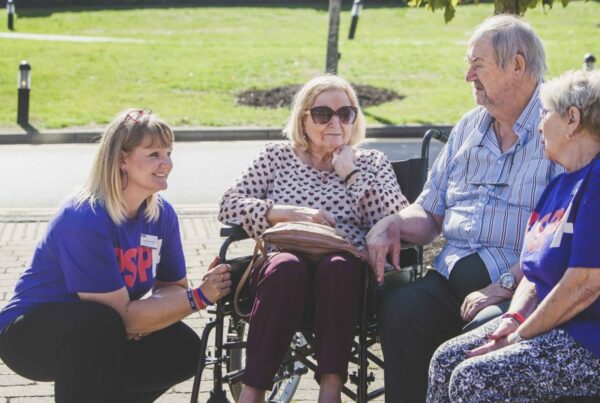
Since PSPA formed, a firm priority has been to keep our supporters informed of the latest news and updates. A newsletter was created to assist with this task in the early years of the charity. In 2008, the newsletter was developed into the 40-page magazine we all know and love as PSPA Matters.
As you can see in our gallery of magazine front covers, the design of PSPA Matters has been refreshed several times. However, the in-depth information, sharing of personal experiences, research news and inspiring fundraising challenges remain firm content favourites.
The magazine is circulated to just over 10,000 people, four times a year. And in recent years, audio files of the magazines have also become available to help more people enjoy the content and feel part of the wider PSP & CBD community.
Download the latest edition of PSPA Matters, here.
To share your personal experience of PSP or CBD or ideas for future magazine content, please email communications@pspassociation.org.uk
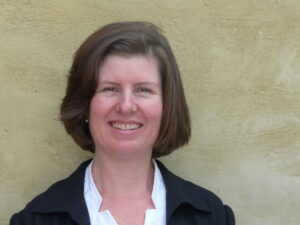
As an Occupational Therapist (OT) working at St Thomas Hospital, London in the 80’s and 90’s, Madeleine Quine (nee Ranicar) had begun to receive referrals to see patients with two conditions she had not heard of before.
The two conditions were PSP & CBD.
At the time, there was little information about PSP & CBD to help Madeleine or other OT’s to assist with their assessments and treatment plans. Madeleine researched, and found the UK Parkinson’s Society had information to share, which they had gathered from America. So, Madeleine worked with the Society to learn more and used this to start writing a guide for PSP & CBD, however for various reasons the document was never printed.
By then, Madeleine had left the NHS, when she spotted a double page article about PSPA in a national newspaper.
Madeleine said: “I couldn’t believe it when I saw the article in the newspaper about a national charity being set up. For years, it had been so difficult, not having an organisation to turn to for advice and information about PSP & CBD. So, I rang Michael Koe to congratulate him on setting the charity up. We got talking about my connection with the conditions, my OT background and I told him about patients I had treated and about the guide I had discussed writing. Not long after, I signed up as a volunteer for the charity in 2000.”
Alongside, Maggie Rose, PSPA Nurse Specialist, Madeleine helped to establish PSPA Support Group in Edinburgh. Michael even came to visit, a couple of years after it had been set up.
Madeleine continues: “The group had been going well in Edinburgh, so Michael came up to visit. It was during this visit that he approached me with the idea of me working for PSPA as one of their Development Officers. I joined PSPA in 2005.”
In her role as Development Officer for Scotland, Madeleine supported the group, set up more groups in Glasgow, Aberdeen and Dumfries and made connections with various healthcare professionals.
Madeleine said: “The charity had been contacted by so many healthcare professionals, I knew there was a need there for developing a guide for therapists. With my OT background it made sense to develop one for the OT profession. As I was no longer a registered OT by this point, I teamed up with two OT’s working at the National Institute for Neurology and Neurosurgery at Queens Square in London: Jo Hurford and Kate Morton.”
After their clinical work, Madeleine would work with Jo and Kate for an hour or two in the evening on content for the guide. It took a fair bit of time to pull together sourcing PSP & CBD journal articles, but the guide was finalised and published in 2008.
“We were so pleased with the guide when it was completed. People seemed thrilled to have a copy as previously, you were very much just learning on the job when a patient with PSP or CBD was referred. I remember going to the College of Occupational Therapist’s conference in Harrogate, and the guides were flying off our exhibition stand. Everyone wanted a copy. The guide had a worldwide impact too. I trained in Melbourne and years after the guide was published I bumped into some OT’s who trained with me and they talked about the guide, not realising I was the Madeleine referenced at the back.”
In 2009, the guide was celebrated with a BMA Medical Book Competition Award, which was presented to Madeleine, Jo and Kate.
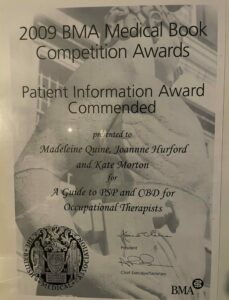
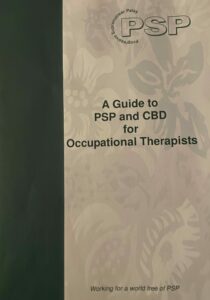
The OT guide is still going strong. Although regularly reviewed and updated, the core information remains.
A big thank you to Madeleine, Jo and Kate for helping to produce this informative publication.
Understanding the positive impact Support Group meetings were having among the PSP & CBD community, PSPA set out to provide more ways for families to connect.
In 2012, our very first Family and Friends Day took place in ! Hosted by Dr Alex Gerhard, Consultant Neurologist, Salford Royal Hospital, day aimed to connect families as well as to provide great opportunities to learn more about the conditions and how healthcare professionals and PSPA can help.
During the day, which was held in Sandbach, Cheshire on 17 November 2012 , we welcomed 41 family members and people living with PSP & CBD to join us for a day of information and connecting, as well as activities such as food demonstrations and massage.
Our Family and Friends Days continue to this day, with the next one planned for June 2024. Keep a look out for more information about where this day is taking place and how you can register to attend for free.
View a few photos from the day below.
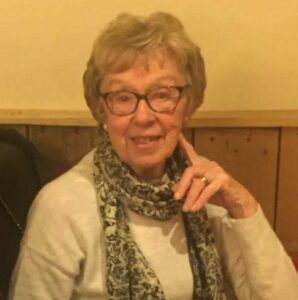
Doreen Walker has supported PSPA since her husband, Raymond, was diagnosed with PSP in 2003.
After becoming a bit unsteady on his feet, Raymond fell off his ladder when decorating. He visited his GP for a check up and the GP referred him for further investigation.
Doreen said: “After his fall our GP referred Raymond for further investigation at our local hospital. The consultant then referred us to Newcastle to see a specialist. It is here, Raymond received his PSP diagnosis.”
Doreen cared for her husband throughout the seven years he lived with PSP, visiting the hospital in Newcastle every three months.
Doreen continued: “It was at the Newcastle clinic I was introduced to PSPA, which at the time was a small outfit being run by Michael Koe and Maggie Rose. Maggie was a PSP nurse and attended the clinic to offer support. She would come into the appointment with us and then following would have a quick catch up about how we were doing. I appreciated this time to discuss any questions I might have.
“Everyone at the clinic and PSPA were very supportive and helpful. And we couldn’t have asked for a better GP, he checked in on us each week too.”
As Raymond’s PSP progressed, and it impacted daily life more, Doreen found she needed some support at home.
“I knew PSPA were at the end of the phone as well as at the clinic, if I needed them. I did ring in between hospital visits a few times, to ask a question or get some reassurance. I received some good advice about funding for care support at home, when I realised I needed some help getting Raymond up and ready for the day and back to bed in the evening. I did get the funding so the advice was very useful.”
Raymond passed away in 2010 and because of the support her and her husband received during their journey, Doreen was keen to stay in touch.
“You can’t help but become close with the health professionals and members of PSPA you speak to regularly. I continued to check in to see how the charity was doing and offer help when needed.
“I remember when Carol joined the charity, to help develop the PSPA Helpline. Carol’s hardworking ethos had things up and running in no time. A year later they were looking for volunteers to help man the evening Helpline and it seemed like a good opportunity for me to get involved.
“I volunteered for the PSPA Evening Helpline for seven years. There is something satisfying about using your own experiences and knowledge of PSP & CBD to help others. It is really important for people to have someone to turn to, whether it is a relative, a friend or a charity. Someone they can talk to without judgement and I felt this was what I was offering as a Helpline Volunteer.
“Although I had stood down as a volunteer by the time COVID-19 hit, I knew how much the pandemic was affecting charities, so I rang in to see if I could help again.
“I was quickly signed up to help stay in touch with PSPA supporters during this difficult time. I had three or four people to ring around once a month, just to check in and see how they were doing and if they had any questions. I did find this very fulfilling.”
Although Doreen isn’t currently volunteer with PSPA anymore, she does check in a couple of times a year to get an update on how the charity it doing.
The PSPA Evening Helpline is still available, with volunteers helping out from 7pm to 9pm, Monday to Friday. In fact, in 2024 the Evening Helpline celebrates its 10th Birthday!
Thank you to Doreen and all our Helpline volunteers for providing essential support to PSPA and the PSP & CBD Community for the past ten years!
